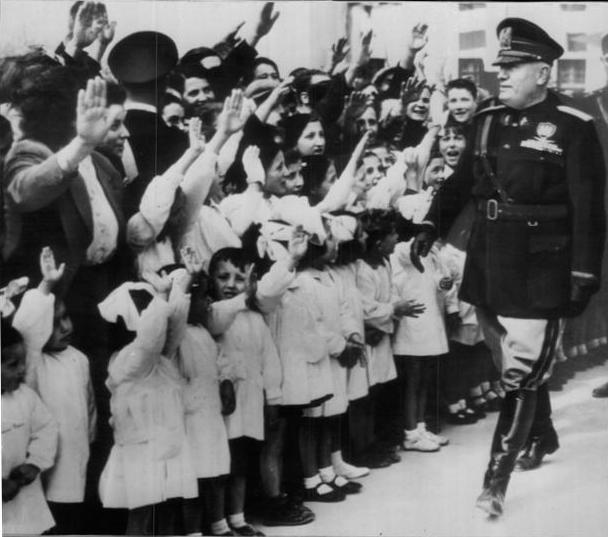
World War II: Mussolini's Calculations (1939-40)

Figure 1.--Here we see Italian dictator Benito Mussolini as he liked to be pictured. The photograph was taken May 15 as he was about to decide to join Hitler in the War. He would not have liked the American newspaper caption which read, "Being a faithful follower of Adolf Hitler, Mussolini likes demonstrationsdand esoecially those in which children engage. He never fails to stress the philosophy of living dangerously must be taught to the younger generation. This picture shows salutes for Il Duce when he inagurated awater supply duistruictin Rome." Mussolini promoted the image of an all powerful. omnisint Fascist leader. In fact, through the Axis Alliance he had painted himself and Italy into adangerous future. He had helped Germany rise to a point where it could dominate Europe. That clearly was not in Italy's best interest. He decided not to join Hitler in the war after Hitler invaded Poland because of the dangers of another world war. Finally after the Germans smashed the French Army abnd drove the British back across the Channel, he could not resist the booty to be had by entering the War.
|
|
For Mussolini's part, war with the Allies was a huge risk. Not only did Italy not have Germany's industrial base, but its geography as a peninsula exposed Italy to Britain's greatest assett, the Royal Navy, in a way that Germany was not. Mussolini appears to have no realistic assessment of the potential of his military, but still he hesitated and maintained his options open with the British. He had to makw two decessions. First not to join Hitler when he launched World War II by invading Poland (September 1939). The second was to finally enter the War by declaring war on Britain and France (June 1940). The Axis was a defensive alliance. Italy was not compeled to join Germany when the country invaded Poland. We know that Mussolini at the time had grave doubts about what he had done in linking Italy so closely with Germany. Not only was he concerned about the Allies if he led Italy to war, but he was concerned about Germany if he did not. Blustering about warwas one thing, actually waging war was a very different matter. He saw fighting the British and French as very different than the Ethiopians and Albanians. He vascilated, at times proclaiming his unity with Hitler and the next day expressing fear of the Germans. In a pattern that would be repeated throughout the War, there was no joint planning, but rather Italy following decesions made in Berlin. Count Ciano writes, "I went to Attolilico [Italian ambassador to Germany who was in Rome] with the Duce. For a moment the fires of the old scruples of loyalty return to the Duce, and he wanted Attolico to confirm to Ribbentrop that, in spite of everything, Italy will march with Germany if thge democracies throw themselves into the furnace of war." [Ciano, August 17, 1939] The very next day, Ciano informs us, "A conversation with the Duce in the morning; his usual shifting feelings. He still thinks it possible that the democracies will not march, and that Germany might do business chaply [mening aggression], from which business he does not wish to be excluded. Then, too, he fears Hitler's rage. He believes that a denunciation of the [Axis] pact or something like itmight induce Hitler to abandon the Polish question in order to square accounts with italy. [Ciano, August 18, 1939.] Ten months later the situation was very different. The Germans had smashed the French Army. The British had withdrawn across the Channel, And without the French it looked like the British would have to withdraw from the Mediterranean. The dangers of going to war were dignificantly reduced. And from Mussolini's point of view, the rapid Germany victories were making it impossible for him to share in the booty of war. There was no longer any thought of withdrawing from the Axis. His concern was how to gain some of the booty and now that the danger had passed to be a great militarry commander. Ciano writes, "Today at eleven at the Palazzo Venezia the High Command was born! Rarely have I seen Mussolini so happy. He has realized his dream: that vof becoming the military Condottiero [leader] of the country at war." [Ciano, May 29, 1040]
Sources
Ciano, Count Galeazzo. The Ciano Diaries, 1939-1943 (Garden City Publishing Co: Garden City, New York, 1946), 582p.
HBC

Navigate the Boys' Historical Clothing Web Site:
[Return to Main Italian World War II options page]
[Return to Main Italian World War II page]
[Return to Main World War II page]
[Return to Main Italian page]
[Introduction]
[Activities]
[Biographies]
[Chronology]
[Clothing styles]
[Countries]
[Bibliographies]
[Contributions]
[FAQs]
[Italain glossary]
[Images]
[Links]
[Registration]
[Tools]
[Boys' Clothing Home]
Created: 6:46 AM 9/3/2010
Last updated: 6:46 AM 9/3/2010



